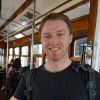
David Pierce
- Course: PhD in Transport Studies
- PhD title: Modelling the economic impacts of inter-city connectivity
- Nationality: British
David is pursuing his PhD in the Institute of Transport Studies after returning to University from working in the industry. He belongs to the Spatial Modelling and Dynamics and Economics and Appraisal research groups.
Developing inter-city transport links
David’s research focuses on investigating how inter-city transport links can allow cities to specialise in sectors in which they have a competitive advantage. He said:
“Effects stemming from inter-city transport links can lead to welfare benefits to society which are not usually included in the assessment of transport schemes. In my research, I’m developing models for estimating the scale of the benefits and how long it takes for them to be realised.”
David aims to contribute to the knowledge base in his field and he’s been taking significant steps towards fulfilling this goal. He continuedː
The findings of my research have so far been shared with the UK’s Department for Transport (DfT) and Transport for the North (TfN) and I would like my research to inform the methods which are used for undertaking appraisals of inter-city transport schemes.
“Ultimately my research could lead to improved decision-making around transport infrastructure investment which can generate welfare benefits to society.”
Funding a PhD
David’s PhD is jointly funded by the EPSRC and Arup. In the first year of his research, David undertook a two-month placement with Arup to work with them on a study for the National Infrastructure Commission (NIC) to make recommendations for transport infrastructure investment in the Oxford-Cambridge Corridor. He said:
“My involvement in the project gave me an understanding of the techniques which are currently used to estimate connectivity benefits and where some of the knowledge gaps are.”
“I have regularly been in contact with Arup during my research and they have had input into my work through attendance at some of my supervision meetings.”
“I have also visited their London offices and presented the findings from my research to a group of their transport economists.“
“My research has also allowed ARUP to build contacts within ITS and learn about the direction of current research in the institute.”
Life as a PhD researcher
On a day-to-day basis, David works in one of the PhD clusters at the Institute for Transport Studies, where he mainly develops dynamic models using specialist modelling software. He saidː
“Being part of two research groups in ITS has enabled me to present at meetings and receive useful feedback for my research. I also to attend helpful workshops offered by academics on writing journals or developing models.”
David also took the responsibility of being a PGR representative for the Economics and Appraisal Group in ITS, which involved organising PGR presentation sessions and workshops. He also initiated joint workshop sessions with PGRs in Leeds University Business School (LUBS) across the two departments.
Influential supervision
David’s research required supervisors from two different fields within transport - system dynamics and economics. They meet once a month where they discuss progress and develop a list of actions.
“I have found it really useful to have supervisors with different research backgrounds as it means I get insights from different perspectives”, David said.
“I find my supervisors very approachableː they regularly provide useful and prompt feedback which helps to drive my research forward.”
Professional development
David has presented the outputs of his research at several conferences and workshops, both in the UK and around Europe. He also wrote a journal paper, which has been accepted for publication, focusing on some of the modelling outputs. He saidː
“Presenting at events such as various conferences and workshops throughout Europe has enabled me to meet a variety of PhD students and academics. Not only have I received valuable feedback for my research, but I’ve also had the chance to develop my perspective and gain wider views by listening to the opinions of my peers from different backgrounds.”
From industry to academia – returning to pursue a PhD
David returned to the University of Leeds after he had studied an MA in Transport Economics in 2005. Following the graduation of his Master’s degree, David worked as a transport consultant for nine years, mainly based in London. He claimed the strong reputation of the Institute for Transport Studies, along with his pleasure of living in Yorkshire made him come back to study for a PhD. He said:
After working as a transport consultant for nine years I was keen to fill some of the knowledge gaps which exist in the transport field.
Career ambitions
David would like to pursue a career in academia given the right opportunity. Otherwise, he would like to return to work as a transport consultant where he can apply the research skills. He saidː
“I aspire to pursue and build on a career in academia, should the opportunity arise. I am really keen to further my research and continue to build on the identified gaps in knowledge in the field. However, applying the skills and knowledge I have acquired during my PhD research to industry would also be a fantastic opportunity.”
He addedː “Whichever direction I choose, I am confident that my background as a researcher will enhance the satisfaction and direction of my career.”

